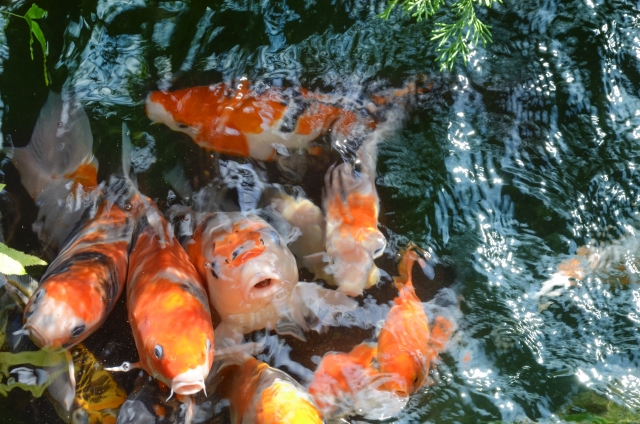<Took a picture if front of the statue of Mori Ohgai with a big smile. 森鴎外の胸像の前で記念撮影、満面の笑みで。>
One summer day, we visited Tsuwano, Shimane prefecture. Main purpose of the visit was to go to Mori Ohgai literary museum and the old residence. Make a trip to historical and literary places is the highlight and most joyful experience of this blog project. Contemplating over historical tides and spirit of great figures, and thinking about traces and carvings that they made onto this country and the world is one of the biggest amusement for history lovers.
夏のとある一日、島根の津和野へと行ってきた。第一の目的は、森鴎外記念館とその隣にある森鴎外旧宅を訪れること。歴史と文学探訪は、このブログ活動において最も愉快な取材旅行となる。歴史の趨勢や文人偉人の精神に思いを馳せ、その刻みつけられた軌跡が、この国に、そしてまたこの世界にどの様な影響を与えたのかと考察するのは、歴史好きにとって大きな醍醐味である。
↓↓↓
Mori Ohgai Wikipdedia
森鴎外 ウィキペディア
Mori Ohgai and Natsume Soseki are the two great literary men, two outstanding intellectual figures in the Meiji era (1868~1912) Japan.
森鴎外と夏目漱石は、明治日本の文学者の巨星として、二大看板として論じられる存在だ。
Please have a read of the blog article of Natsume Soseki.
以前、夏目漱石についての記事を書いているので、是非ご一読を。
↓↓↓
Soseki and London
Mori Ohgai, real name; Mori Rintaro studied in Germany as an army doctor. He was praised as a prodigy and contributed to Westernization and Modernization in Meiji era Japan with extraordinary linguistic talent. Not only that, as an army doctor he wrote about his complex inner conflict and established his literature with tough determination.
森鴎外、本名森林太郎は軍医としてドイツで学び、幼き頃から神童と賞賛された俊秀と卓越した語学力を持って、明治日本の西欧化と近代化に寄与しつつ、軍医としての複雑な内面の葛藤を、書くという言語表現で強靭な肉付けをしていった人だ。


(Interior of the old residence of Ohgai that he spent in childhood, reconstructed in a new location. 鴎外が幼少期を過ごしたとされる旧宅の内観、移築されたもの)
According to a book album about Ohgai’s life, “Ohgai gave massive impact on young people in the days by expressing modern Western poetic atmosphere with artistic aroma in the refined classical Japanese writing. ” This time I reread “Maihime; Dancing Princess” and read “vita sexualis; sexual life ” and his literary album that bought in the museum. He was fluent in German, English, French, Latin, and Sanskrit also. There yields gigantic intellect, and in his words huge pride that never let others compete is floating here and there.
「新潮日本文学アルバム 森鴎外」によると、「西洋の近代詩の面影を芸術的香気の高い典雅な日本語で表出するというこころみは、時代の若い人々に強烈な影響を与えた。」とある。今回、「舞姫」を読み返し、「ヰタ・セクスアリス」と「新潮文学アルバム 森鴎外」も記念館で購入して読んでみた。ドイツ語、フランス語、英語、ラテン語、そしてサンスクリットにも通暁している文章には、巨大な知性が宿っているし、鴎外の文語体の文章は、他の追随を一切赦さない、傲岸不遜とも言える誇りがそこかしこに漂っている。


And in my interpretation, the hyper-productive brilliant guy proved his magnificence by never wasting a moment in life. He was a severely macho guy who followed own meticulous plans through and through.
私なりの解釈で言えば、超生産型の秀英は、自分の偉大さを証明し尽くすために、生涯の時間を一瞬たりとも無駄にしなかった、激烈にマッチョかつ緻密な計画性に従って生きた男だった。
Some time ago, I analyzed Natusme Soseki and Mori Ohgai comparing one another.
こちらは以前、漱石と鴎外を比較分析したノートの書き留め。

Natsume Soseki possessed a knotty and imaginative labyrinth inside and Mori Ohgai had a map of crystal clear clarity in him. Soseki studied in London and spent days of gloom and depression, eventually he was on the verge of mental breakdown that “Natsume got insane” . On the other hand, Ohgai proved his excellence having disputes with the local scholar by using his outstanding German from the day he arrived at Germany. In his book, Ohgai wrote that he received huge jealousy countless times. All along, he was studying Hygiene as an army doctor, staying in Germany for about 3 years.
漱石は錯綜しつつも想像力に富んだ迷路を内に抱え、鴎外の頭脳は明晰で水晶の様に澄み切った地図であったと説明がつく。イギリスで学んだ漱石は、孤独のうちにロンドンでの陰鬱な日々を過ごし、「夏目狂セリ」となるほどに神経症で追い詰められた。一方鴎外は、ドイツに着くなり卓越したドイツ語を駆使して、ドイツ人学者と論戦を戦わせ、その才に大きな嫉妬を受けることも多々あったと自著に書いている。軍医として衛生学を学びつつ、だ。ドイツにはおよそ三年滞在して居た。
However, what interests me the most is that Ohgai was stimulated and challenged by the literature of Soseki immensely and Ohgai could not help but prove his literary talent. Ohgai’s rival at heart was Soseki.
しかし、一番面白いことは、鴎外は漱石の文学に大いに刺激触発され、<技癢(ぎよう)を感じ> 自らの文学的才能を証明せずには居られなくなったことなのだ。鴎外の心のライバルは漱石だったのだ。
But among all, what distinguished Ohgai from others is that he experienced a sad love romance with a beautiful dancer while studying in Germany, later on he sublimated the tragic incident into a work titled “Maihime; Dancing Princess” . The love had a sorrowful ending, but Ohgai started his writer career transforming the scars into literature. And he kept writing vigorously and did a lot of translation works as well. After he finished working as an army doctor in the daytime, he never had a day that he didn’t write anything at desk at night util he passed away.
それでもやはり、何よりも凄いと思うのは、「舞姫」の作品として昇華された美しいドイツの踊り子との恋愛事件を、留学中に経験したこと。この恋の顛末は悲恋に終わったけれど、その心の傷を素材とした文学で鴎外は作家として出発を果たし、その後も勢力的に小説を書き、実に多くの翻訳を終生続けて行ったということ。昼の軍医としての勤めを終え、夜に机に向かって何かを書かない日は、亡くなるまで一日たりともなかったそうだ。

(Brought a book of Ohgai that I read in high school, written in classical Japanese. The book of almost 30 years ago became spotty, 320 yen. 高校生の頃に読んだ、文語体で書かれた鴎外の著書をしのばせて行った。三十年近く前の文庫は、シミだらけになっていた。定価320円とある。)
In a few words Ohgai can be described as “an absolute iron intellectual” that never showed weakness. And maybe that’s why I’m not attracted. I once read that “you fall in love with someone’s flaw”, and I agree with that. Ohgai succeeded to gain everything one can desire; intellect, honor, fame, thriving family, prestige, position, admiration, wealth, and influence to the future generations, without going through a single collapse. However, I never get attracted to this guy as a person.
鴎外像を一言でまとめると、自分の弱みを一切外に出さない「完全無欠の鉄人知識人」だ。だからなのか、私は全く鴎外に惹きつけられない。「人は欠損に恋をする」という言葉を読んだことがあるが、生涯一度も破綻を経験せずに、この世で手に出来る知性、栄光、名声、子孫繁栄、権威、地位、賞賛、財力、後世への影響力等々をことごとく我がものとした鴎外には、残念ながら全く人間としての魅力を感じないのだ。
You fall in love when experienced feeling of “being touched the heartstrings, echoing one another” as a deep personal working. So it can be interesting that someone’s flaw and weakness can be the biggest charm of the person. Ohgai might have proved it paradoxically.
「心の琴線に触れる、心と心が通い合う」という経験を、個人的な営みとして他の誰でもない我がこととして深く持ち得た時に、人は人を好きになる。人としての弱さや綻びが、その人の最大の魅力になり得るというのは、逆説的に鴎外が証明してくれている様で、それもまた面白いのかもしれない。
Left the Ohgai literary museum, walked in the scorching heat for quite a while and arrived at Tsuwano Catholic Church.
鴎外記念館を出て、灼熱の日差しの中を長いこと歩き、津和野カトリック教会へ。

Church with tatami mats to sit on directly is rare even in Japan. This is a small church, but has history of Christian persecutions. It was wrapped with the atmosphere of genuine prayers that I also sensed in Kölner Dom in Germany; Cologne Cathedral that is UNESCO world heritage site. Pondering over something bigger than oneself, and the heart that dedicates prayers for something eternal.
畳敷きでそのまま座るという教会は、日本でも珍しい。ここは小さな教会だが、キリシタン弾圧の歴史を持っている。ユネスコ世界遺産であるドイツのケルン大聖堂で感じたのと同じく、浄福な祈りの気配が満ちて居た。自己という存在を超えたものを、深遠なる思いで愛おしみ、祈る心について考える。


Love and Peace. Blessings to you all.
愛と平和を。皆様に祝福があります様に。
参考文献
「新潮日本文学アルバム1 森鴎外」新潮社、1985年
「舞姫」森鴎外、新潮社、昭和四十三年
「ヰタ・セクスアリス」森鴎外、新潮社、昭和二十四年






















